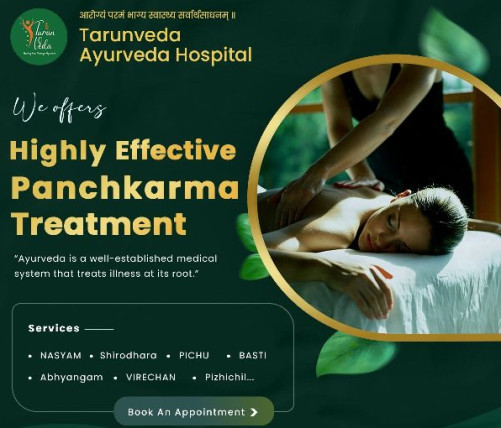Panchakarma Hospital in Delhi: Your Guide to Wellness at Tarunveda
In today’s fast-paced world, stress and health issues are prevalent, prompting many to seek holistic healing methods. Panchakarma, an ancient Ayurvedic detoxification and rejuvenation therapy, has emerged as a popular choice for those seeking to restore balance to their mind, body, and spirit. Tarunveda Ayurveda Hospital, recognized as one of the leading Panchakarma hospitals in Delhi, offers a range of treatments tailored to individual needs, ensuring a comprehensive approach to wellness.
This blog will provide an in-depth look at Panchakarma, its benefits, the procedures involved, and why Tarunveda Ayurveda Hospital stands out as the go-to destination for Panchakarma therapy in Delhi.
Understanding Panchakarma
Panchakarma translates to "five actions" in Sanskrit, referring to a series of five therapeutic treatments aimed at detoxifying and rejuvenating the body. The main goals of Panchakarma are to eliminate toxins, restore balance, and enhance overall health.
The five primary therapies include:
- Vamana (Therapeutic Vomiting)
- Virechana (Purgation)
- Basti (Enema)
- Nasya (Nasal Administration)
- Raktamokshana (Blood Letting)
Each therapy targets specific doshas (body energies) and aims to address various health issues.
The Importance of Panchakarma
- Detoxification: The primary goal of Panchakarma is to cleanse the body of accumulated toxins (ama) that may contribute to illness.
- Restoration of Balance: Panchakarma treatments help restore the balance of the three doshas—Vata, Pitta, and Kapha—essential for good health.
- Enhancement of Immunity: Regular Panchakarma treatments strengthen the immune system, making the body more resilient against diseases.
- Stress Relief: The therapies promote deep relaxation and mental clarity, effectively reducing stress and anxiety.
- Holistic Healing: Panchakarma addresses not just physical ailments but also mental and emotional health, leading to overall well-being.
Benefits of Choosing Tarunveda Ayurveda Hospital
Tarunveda Ayurveda Hospital is committed to providing the highest quality Panchakarma treatments, ensuring a safe and effective healing environment. Here are some reasons why you should choose our hospital for your Panchakarma needs:
- Expert Practitioners: Our team comprises experienced Ayurvedic doctors and therapists who specialize in Panchakarma treatments.
- Personalized Treatment Plans: We believe in a personalized approach, crafting treatment plans tailored to each individual's health needs and concerns.
- State-of-the-Art Facilities: Our hospital is equipped with modern amenities and a serene environment that enhances the healing experience.
- Holistic Approach: At Tarunveda, we focus on holistic wellness, integrating dietary guidance, lifestyle modifications, and yoga practices alongside Panchakarma therapies.
- Patient Education: We prioritize educating our patients about the benefits of Panchakarma and the importance of maintaining a balanced lifestyle post-treatment.
The Panchakarma Process at Tarunveda Ayurveda Hospital
Step 1: Initial Consultation
Every treatment journey begins with an in-depth consultation with our Ayurvedic specialists. This assessment involves:
- A detailed health history
- Physical examination
- Assessment of dosha imbalances
Based on this evaluation, the doctor recommends specific Panchakarma treatments tailored to your needs.
Step 2: Pre-Treatment Preparation
Before beginning the Panchakarma therapies, patients undergo a preparatory phase that may include:
- Snehana (Oleation): Applying medicated oils to the body to loosen toxins.
- Swedana (Sweating): Inducing sweating to help release toxins from the body.
Step 3: The Five Therapies
Once the body is adequately prepared, the five primary therapies are performed:
- Vamana: This involves therapeutic vomiting to expel toxins from the upper digestive tract.
- Virechana: This purgation therapy cleanses the lower digestive tract and is particularly effective for Pitta imbalances.
- Basti: Enema therapy using herbal oils or decoctions, crucial for balancing Vata dosha.
- Nasya: Medicated oils or powders are administered through the nasal passage to clear the sinuses and improve respiratory health.
- Raktamokshana: Bloodletting is performed when necessary, particularly for conditions like skin disorders.
Step 4: Post-Treatment Care
Post-Panchakarma, our specialists provide guidelines on dietary modifications, lifestyle changes, and yoga practices to maintain the benefits achieved through treatment.
Common Health Conditions Treated with Panchakarma
Panchakarma therapy is beneficial for various health conditions, including:
- Stress and anxiety
- Digestive disorders
- Allergies and respiratory issues
- Skin diseases
- Joint and muscle pain
- Hormonal imbalances
- Weight management
- Chronic fatigue
Testimonials from Tarunveda Ayurveda Hospital Patients
"My experience at Tarunveda has been transformative. The Panchakarma therapy helped me overcome chronic stress and improve my overall health." - Priya S.
"The team at Tarunveda is professional and caring. They guided me through every step of the Panchakarma process, and I felt rejuvenated after my treatments." - Rajesh K.
Conclusion
Choosing the right Panchakarma hospital is crucial for effective treatment and recovery. Tarunveda Ayurveda Hospital stands out as a leading Panchakarma hospital in Delhi, offering expert care, personalized treatment plans, and a holistic approach to health. Our dedication to patient well-being and education ensures that you receive the best possible care on your journey to wellness.
Experience the healing power of Panchakarma at Tarunveda Ayurveda Hospital and embark on a path to rejuvenation and holistic health.




Comments
Post a Comment